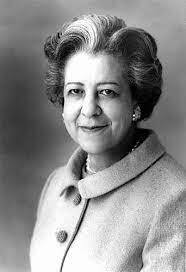Helen Jackson Claytor
Life Dates: b. April 12, 1907, d. May 10, 2005
Full Name: Helen Natalie Jackson Wilkins Claytor
Birthplace: Minneapolis, Minnesota
Tags: Community Activism, Education, Civil Rights, Community Organizations, Women’s Clubs, Oral History
Helen Natalie was the third of four daughters born to Amy and Madison Jackson. Her father was the first black man to pass the bar in South Dakota. He moved the family to Minneapolis, MN, for the specific purpose of being close to a university where his girls could go and save money on room and board. Ms. Claytor recalled that “Poppa” built a house so they lived closer to the university than any other black family in Minneapolis.
Ms. Claytor described herself as “bookish” as a little girl and was valedictorian of her high school class. She was also Phi Beta Kappa in college and graduated in 1928 with a major in English and a minor in Social Services Administration. Although she had “the best kind of training in schools in Minneapolis and . . . was trained to teach,” Ms. Claytor found no teaching jobs in the area for blacks. In fact, although she worked professionally her entire adult life, she never had a teaching job.
In 7th or 8th grade, Ms. Claytor had started at the YWCA in the “Girl Reserves” and had remained active in “College YWCA.” Through this network after college, she found a job with the “racial branch” of the YWCA in Trenton, NJ. From 1928 through 1930, Ms. Claytor worked for this branch, which was only a few blocks from the “main YWCA.” In 1930, after marrying Earl Wilkins, who was working at a local newspaper, Ms. Claytor moved to Kansas City, MO, and went back to work at the city’s YWCA. By the late 1930s, Mr. Wilkins died of tuberculosis. Ms. Clayton was left alone with a young son, Roger. In 1940, Ms. Claytor and her son and mother moved to New York City, where Ms. Claytor joined the board of the YWCA of the United States.
In 1943, Ms. Claytor remarried Dr. Robert Claytor and moved to Grand Rapids, MI, in 1944. For the first year of her second marriage, Ms. Claytor commuted between Grand Rapids and New York City, where she was completing a National YWCA study of interracial practices in community YWCAs. This study eventually led to the desegregation of YWCAs. Before her time, there was racial segregation in the YWCA, schools, public pools, and college residence halls and cafeterias. Black people were either separated from or not allowed into public institutions or facilities that white people used.
Ms. Stauffer asked Ms. Claytor to meet with black male leaders who had been resisting Ms. Stauffer’s overtures. She thought they might be more responsive to a black national staff member. Ms. Claytor met with them and recalled “that was the best thing [Norma] ever did.
That’s where I met Bob [Dr. Robert Claytor].” She added that she knew nothing about Grand Rapids and never planned on staying there. Yet, after she moved to Grand Rapids in 1944, Ms. Claytor began volunteering at the YWCA. That year, she was elected to the board, and the next year, she was elected to the national board.
From 1949 through 1951 she was the first black woman to be elected President of a “total” YWCA in any community in the United States. In 1967, she repeated this distinction when she became the first black woman to head the national YWCA board. She served in that position until 1973. In 1974, she resigned from the board. Helen Claytor also served on the World Council of the YWCA, which extended her travels all over the world.
As President of the National Board, Helen Claytor took a leading role in drafting the YWCA Purpose in 1967, which she regarded as a major accomplishment of her career. Under her leadership, all groups within the YWCA coalesced around one imperative: “The elimination of racism wherever it exists and by any means necessary.” This imperative has been renewed at every convention since that time.
She also served on other national boards: National Women’s Advisory Committee for Civil Rights; National Office of Equal Opportunity; Widow Persons Service; and Hospice.
Ms. Claytor said “. . . the thing [she felt was her] lasting” legacy was her part in the founding of the Community Relations Service, which became the local Equal Opportunity Office. Locally, she also served on the board of the Community Health Service, which was later joined with Visiting Nurses, and the Family Services Association.
Helen Claytor continued her activities for the YWCA, her church, and her community until her death in 2005 at the age of 98. Her life and leadership were an inspiration to women of all ages and races. Grand Rapids was fortunate to have her call it her home.
Related Links:
This biography is adapted from a transcript of an oral history interview with Helen Claytor. Learn more about oral histories here.
Helen J. Claytor Michigan Women’s Hall of Fame Biography
Greater Grand Rapids Women’s History Council. “Helen Jackson Claytor First Black Woman President of YWCA.” Women’s Lifestyle Grand Rapids, July 2018. http://digital.zoompubs.com/publication/?m=4080&i=508894&p=32&%3Barticle_id=3128888&%3Bview=articleBrowser&ver=html5.
“Helen Claytor.” Grand Rapids Press, May 13, 2005. https://obits.mlive.com/us/obituaries/grandrapids/name/helen-claytor-obituary?id=14312747.

